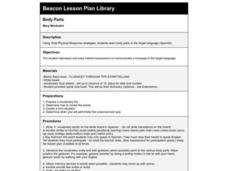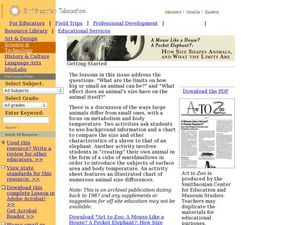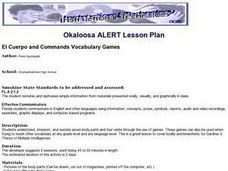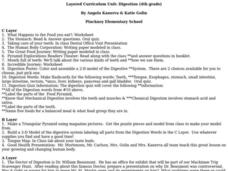Curated OER
Better Body Books, Inc.
Students work in groups of 2-3 people to prepare a book about the human body that is suitable for a 3rd, 4th, or 5th grade student.
Curated OER
How to Make a Model of the Human Respiratory System
Students label parts of the human respiratory system on a diagram. They explain the function of diaphragm.
Curated OER
Watershed Tourist
Young scholars recognize and categorize different bodies of water. In this watershed and water environments instructional activity, students "Follow the Water from Brook to Ocean." Young scholars define the different bodies of water and...
Curated OER
How Size Shapes Animals
Students investigate how size affects large and small animals differently. In this animal lesson plan, students determine how size affects different animals by constructing their own animal out of marshmallows. Once students create...
Curated OER
Human Abstraction
Students explore and compare abstraction of human forms in various ancient cultures and by creating self-portraits using geometric shapes. They identify which geometric shapes form the following features: face, nose, arms, torso, legs,...
Curated OER
Touch and Abstinence
FLASH has put together another good lesson about touch and abstinence. Humans need human touch, yet many confuse this need for touch, and their desire for sex. Discuss the four types of touch with your health or teen issues class. There...
Curated OER
Muscular and Skeletal Systems
How do muscles move bones? Find out using a built-in-class model. Pupils construct a hand model with paper and string, then follow a series of directions to explore the movement process. Discover additional information about the muscular...
Curated OER
Reproductive System
Fifth graders identify and define parts of the reproductive system. For this health lesson, the teacher introduces the parts of the reproductive system, then students match body part cards to the corresponding definition cards.
Curated OER
Food Labels in the Classroom
Learners study the nutritional information on food labels and become familiar with the basic dietary needs of the human body. They write letters to food companies.
Curated OER
Three Dimensional Art of Vertebrates and Invertebrates
Young scholars, during this twelve week series of lessons, learn basic anatomy through life sketches of human skeletons and shells. They learn fundamentals of line and convey life through sketches learning science through art.
Curated OER
El Cuerpo and Commands Vocabulary Games
Young scholars study Spanish vocabulary words for body parts, and also study a number of action verbs. They participate in Total Physical Response by responding to teacher given commands. They play a number of games based on the vocabulary.
Curated OER
Puberty: Day 2
Learners investigate human health by researching sexual health facts. In this puberty lesson, students identify the changes that will occur in a teenage body over the next several years and what the eventual outcome will be. Learners...
Curated OER
Summer Health Activity: Visiting the Doctor
Students play with dolls to act out feelings about a common experience. In this early childhood lesson plan, students use social, language, and fine motor skills while developing an understanding of their own bodies and the role of an...
Curated OER
Aerobic Frisbee Golf
Students work cooperatively to accurately throw a Frisbee in order to learn about fitness components and different systems of the human body.
Curated OER
Organ Systems
Students state the name of major body systems, They identify what each system does and list the major organs in each system. In addition, they complete a puzzle matching organ systems to organ function.
Curated OER
Human Population's Response to Re-emerging and Emerging Infectious Diseases
Students examine the human population response to microbial diseases. In this disease lesson students observe population trends, write about a scientist and evaluate and defend current treatments for infectious diseases.
Curated OER
Can Acids and Bases Remedy the Body?
Students try to cure an upset stomach. In this acids and bases in the body lesson, students create a upset stomach with a vinegar and water solution, then use antacids and home remedies to attempt to restore pH balance to the mixture.
Curated OER
Digestion
Fourth graders answer the question what happens to the food you eat? They complete a worksheet about the food you eat. They discuss the different types of teeth that we have. Students complete digestion poster in which they color and...
Missouri Department of Elementary
How Much Does Smoking Really Cost?
Following a brief survey about tobacco, scholars examine a fact sheet to answer questions about the substance. A practice page challenges the class to determine the cost of the habit using money math. Pupils discuss their findings...
Curated OER
The Human Skeletal System: Inside and Out
Students study bone size, structure and shape. They use various geometrical shapes to make a skeleton and produce a poster depicting the skeletal system and its functions. They arrange the pictures into the five sections, glue on...
Curated OER
Lub Dub
Students name the vessels and parts of the heart. They trace the path of blood through the heart. Students examine the function of the circulatory system. They recognize the differences between a hear when the body is at rest opposed to...
Curated OER
Circulatory and Respiratory Systems
Eighth graders are able to write a paragraph describing each system based on the information retrieved in class. They trace a route from Holly Springs, MS to Greenwood using the maps that they were given. Students discuss the role of...
Curated OER
Oxygen Cycle
Students run clockwise around a track in the gym, pretending they are the blood that carries oxygen through the body. They go to the "mouth" station where they take three breaths and pick up an object that represents oxygen. Students...

























